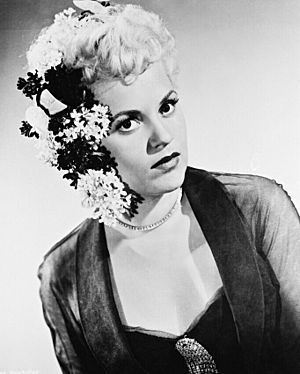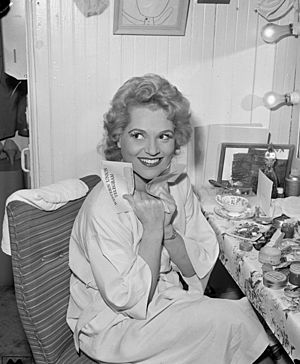Judy Holliday facts for kids
Quick facts for kids
Judy Holliday
|
|
|---|---|

Holliday c. 1950s
|
|
| Born |
Judith Tuvim
June 21, 1921 Queens, New York City
|
| Died | June 7, 1965 (aged 43) Manhattan, New York City
|
| Resting place | Westchester Hills Cemetery |
| Occupation | Actress |
| Years active | 1938–1963 |
| Spouse(s) |
David Oppenheim
(m. 1948; div. 1957) |
| Partner(s) | Gerry Mulligan (1958–1965; her death) |
| Children | Jonathan Oppenheim |
Judy Holliday (born Judith Tuvim, June 21, 1921 – June 7, 1965) was a talented American actress, comedian, and singer.
She started her career performing in nightclubs. Later, she became famous for her work in Broadway plays and musicals. Her big break came with the play Born Yesterday in 1946.
Judy Holliday then starred in the movie version of Born Yesterday in 1950. For this role, she won an Academy Award for Best Actress and a Golden Globe Award for Best Actress – Motion Picture Musical or Comedy. She also won a Tony Award for Best Performance by a Leading Actress in a Musical for her role in the Broadway musical Bells Are Ringing. She later played the same role in the 1960 film.
In 1952, Judy Holliday was asked to speak to a special government committee. They wanted to know if she was connected to communism.
Contents
Early Life and Beginnings
Judy Holliday was born Judith Tuvim in New York City. She was the only child of Abe and Helen Tuvim. Her father worked for a Jewish organization and was also a political activist. Her mother taught piano.
Judy grew up in Sunnyside, Queens, New York. She went to Julia Richman High School in Manhattan. Her first job was helping at the Mercury Theatre. This theater was run by famous people like Orson Welles.
Starting in Show Business
Judy Holliday began her acting career in 1938. She was part of a nightclub group called The Revuers. Other members included Betty Comden and Adolph Green. They performed in many famous New York nightclubs.
A friend of the group, Leonard Bernstein, sometimes played the piano for them. In 1940, The Revuers even released a record. They also filmed a scene for a movie called Greenwich Village in 1944, but their part was cut.
Judy found these early years challenging. She said she was very shy and not a good actress at first. But she learned a lot from performing in tough environments.
Rising to Stardom
Judy Holliday's first movie role was in Winged Victory (1944). She then made her Broadway debut in 1945 in a play called Kiss Them for Me. She won an award for being a promising new actress that year.
The Role That Made Her Famous
In 1946, Judy returned to Broadway in Born Yesterday. She played the character Billie Dawn, a seemingly ditzy but smart woman. The play's writer, Garson Kanin, chose Judy for the role.
When Hollywood decided to make Born Yesterday into a movie, the studio boss, Harry Cohn, didn't want to cast Judy. He thought she was unknown. But famous actors like Spencer Tracy and Katharine Hepburn helped her. They got her a key role in their film Adam's Rib (1949).
Judy received amazing reviews for her performance in Born Yesterday on Broadway. Because of this, Harry Cohn finally offered her the lead role in the movie version.
She won the first Golden Globe Award for Best Actress – Motion Picture Musical or Comedy. At the 23rd Academy Awards, she also won the Academy Award for Best Actress. She beat out many famous actresses for this award.
Judy Holliday also starred with Jack Lemmon in his first two movies. These were the comedies It Should Happen to You and Phffft! (both 1954).
Many people praised Judy's acting. Director George Cukor said she had a special way of showing deep feelings. She could quickly change from being funny to being serious, which touched people's hearts.
Government Investigation
In 1950, Judy Holliday's name appeared on a list of artists who were thought to be "pro-Communist." This was during a time when the U.S. government was very concerned about communism.
In 1952, she was asked to appear before a special committee in the U.S. Senate. This committee was looking into possible Communist activities in the entertainment industry. Judy was one of several actors accused of helping groups linked to communism.
When she spoke to the committee, Judy was advised to act a bit "dumb," like her character Billie Dawn. She did, and it often made the committee members laugh. She said she was against communism but believed in free speech for everyone.
Judy later wrote that she was proud she didn't "name names" of other people. The investigation ended after three months. Unlike some others, Judy's career was not badly harmed by these accusations.
Later Career and Final Years
After a few years, Judy Holliday returned to film. She starred in The Solid Gold Cadillac (1956).
In November 1956, she went back to Broadway. She starred in the musical Bells Are Ringing. Her friends from The Revuers, Betty Comden and Adolph Green, wrote the story and songs. In 1957, she won a Tony Award for Best Leading Actress in a Musical for this role.
Her last film was the movie version of Bells Are Ringing (1960).
In October 1960, Judy started working on a new play called Laurette. However, she became ill and had to leave the show. It closed before it even opened on Broadway.
She had surgery for a throat tumor shortly after leaving the play. Her very last role was in the musical Hot Spot in 1963. This show closed after only 43 performances.
Personal Life
In 1948, Judy Holliday married David Oppenheim. He was a clarinet player and later a music producer. They had one son, Jonathan, before they divorced in 1957. Later, Judy had a long-term relationship with jazz musician Gerry Mulligan.
In 1960, Judy Holliday received a star on the Hollywood Walk of Fame in Los Angeles.
Judy Holliday passed away on June 7, 1965, in New York City. She was almost 44 years old. She was buried in the Westchester Hills Cemetery in New York.
Filmography
| Year | Film | Role | Other notes |
|---|---|---|---|
| 1938 | Too Much Johnson | Extra | short subject |
| 1944 | Greenwich Village | Revuer | scene cut, but Holliday is still visible as an uncredited extra |
| Something for the Boys | Defense plant welder | uncredited bit role | |
| Winged Victory | Ruth Miller | ||
| 1949 | Adam's Rib | Doris Attinger | Nominated – Golden Globe Award for Best Supporting Actress – Motion Picture |
| On the Town | Daisy (Simpkins' MGM date) | uncredited, voice only | |
| 1950 | Born Yesterday | Emma "Billie" Dawn | Academy Award for Best Actress Golden Globe Award for Best Actress – Motion Picture Musical or Comedy Jussi Award Diploma of Merit for Best Foreign Actress New York Film Critics Circle Award for Best Actress (2nd place) |
| 1952 | The Marrying Kind | "Florrie" Keefer | Nominated – BAFTA Award for Best Foreign Actress |
| 1954 | It Should Happen to You | Gladys Glover | |
| Phffft | Nina Tracey née Chapman | Nominated – BAFTA Award for Best Foreign Actress | |
| 1956 | The Solid Gold Cadillac | Laura Partridge | Nominated – Golden Globe Award for Best Actress – Motion Picture Musical or Comedy |
| 1956 | Full of Life | Emily Rocco | |
| 1960 | Bells Are Ringing | Ella Peterson | Nominated – Golden Globe Award for Best Actress – Motion Picture Musical or Comedy |
Radio Appearances
| Year | Program | Episode | Co Star |
|---|---|---|---|
| 6/13/48 | Ford Theater | My Sister Eileen | w/ Shirley Booth & Virginia Gilmore |
| 1/21/51 | The Big Show | n/a | w/ Fred Allen & Eddie Cantor |
| 2/4/51 | The Big Show | n/a | w/ Fred Allen & Robert Cummings |
| 2/25/51 | The Big Show | n/a | w/ Tallulah Bankhead & Jack Haley |
| 3/25/51 | The Big Show | n/a | w/ Jimmy Durante & Carmen Miranda |
| 3/30/51 | Hear It Now | The Human Tick | w/ Edward R. Murrow (host) |
| 4/1/51 | The Big Show | n/a | w/ Groucho Marx & Bob Hope |
| 4/22/51 | The Big Show | n/a | w/ Tallulah Bankhead & Fred Allen |
| 1/2/57 | Recollections At 30 | Ladies Night | w/ The Revuers (from 1940) |
Stage Performances
| Year | Production | Role | Other notes |
|---|---|---|---|
| 1942 | My Dear Public | with The Revuers | |
| 1945 | Kiss Them for Me | Alice | |
| 1946 | Born Yesterday | Billie Dawn | |
| 1951 | Dream Girl | Georgina Allerton | |
| 1956 | Bells Are Ringing | Ella Peterson | Tony Award for Best Performance by a Leading Actress in a Musical |
| 1960 | Laurette (play) | Laurette Taylor | Closed out-of-town |
| 1963 | Hot Spot | Sally Hopwinder |
Discography
Judy Holliday recorded two studio albums during her life, not including her movie and Broadway soundtracks.
- Trouble Is a Man (1958)
- Holliday with Mulligan (DRG, 1961 [1980]) with Gerry Mulligan
Images for kids
See also
 In Spanish: Judy Holliday para niños
In Spanish: Judy Holliday para niños
 | Georgia Louise Harris Brown |
 | Julian Abele |
 | Norma Merrick Sklarek |
 | William Sidney Pittman |




